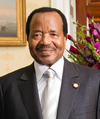
Cameroon, officially the Republic of Cameroon, is a country in Central Africa. It shares boundaries with Nigeria to the west and north, Chad to the northeast, the Central African Republic to the east, and Equatorial Guinea, Gabon and the Republic of the Congo to the south. Its coastline lies on the Bight of Biafra, part of the Gulf of Guinea and the Atlantic Ocean. Due to its strategic position at the crossroads between West Africa and Central Africa, it has been categorized as being in both camps. Its nearly 27 million people speak 250 native languages and English or French or both.

Paul Biya is a Cameroonian politician who has served as the President of Cameroon since 6 November 1982, having previously been Prime Minister of Cameroon from 1975 to 1982. He is the second-longest-ruling president in Africa, the longest consecutively serving current non-royal national leader in the world and the oldest head of state in the world.

The Cameroon People's Democratic Movement is the ruling political party in Cameroon. Previously known as the Cameroonian National Union, which had dominated Cameroon politics since independence in the 1960s, it was renamed in 1985. The national president of the CPDM is Paul Biya, the president of Cameroon, while the secretary-general of the party Central Committee is Jean Nkuete.
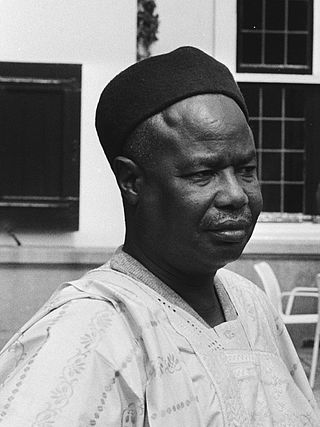
Ahmadou Babatoura Ahidjo was a Cameroonian politician who was the first President of Cameroon, holding the office from 1960 until 1982. Ahidjo played a major role in Cameroon's independence from France as well as reuniting the French and English-speaking parts of the country. During Ahidjo's time in office, he established a centralized political system. Ahidjo established a single-party state under the Cameroon National Union (CNU) in 1966. In 1972, Ahidjo abolished the federation in favor of a unitary state.

Philémon Yunji Yang is a Cameroonian politician who served as Prime minister from 30 June 2009 to 4 January 2019. Previously he was Assistant Secretary General of the Presidency, with the rank of minister, from 2004 to 2009. He served in the government from 1975 to 1984 and was Cameroon's Ambassador to Canada from 1984 to 2004. He is the longest-serving Prime Minister in Cameroonian history.

Under the current Constitution of Cameroon, the Prime Minister of Cameroon is a relatively powerless position. While the Prime Minister is officially appointed to be the head of government, the President retains most of the executive power and can fire the Prime Minister at will.

Ephraïm Inoni is a Cameroonian politician who was Prime Minister of Cameroon from 2004 to 2009. He was a long-time aide of President Paul Biya and is a member of the ruling Cameroon People's Democratic Movement (RDPC). He was appointed to the position of Prime Minister by Biya on December 8, 2004 and was sworn in that day.
An attempted coup d'état occurred in Cameroon in 1984, when presidential palace guards unsuccessfully tried to overthrow President Paul Biya. The fighting that resulted began on April 6, 1984, and ended several days later. The coup attempt is widely viewed as one of the most crucial events in the history of Cameroon since independence in 1960.
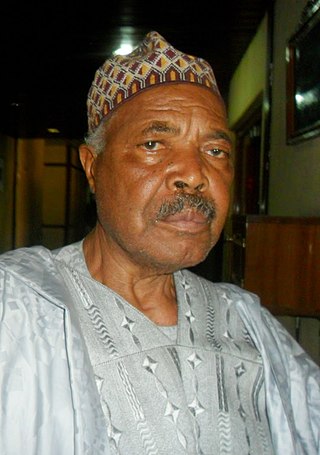
Simon Achidi Achu was a Cameroonian politician who served as the prime minister of Cameroon from 1992 to 1996. Previously he was Minister of Justice from 1972 to 1975. A leading member of the Cameroon People's Democratic Movement (CPDM), Achidi Achu was appointed Chairman of the National Investment Corporation in 2003, and he was elected to the Senate of Cameroon in 2013.
Bello Bouba Maigari is a Cameroonian politician currently serving in Joseph Ngute's government. He was the 2nd Prime Minister of Cameroon from 6 November 1982 to 22 August 1983 and has been the National President of the National Union for Democracy and Progress (UNDP) since January 1992. Although he was a key opposition leader for much of the 1990s, he has participated in the government since December 1997; he was Minister of State for Industrial and Commercial Development from 1997 to 2004, Minister of State for Post and Telecommunications from 2004 to 2009, and Minister of State for Transport from 2009 to 2009. Since December 2011, he has been Minister of State for Tourism and Leisure.
Luc Ayang is a Cameroonian politician who served as 3rd Prime Minister of Cameroon from 1983 to 1984. He has been President of the Economic and Social Council of Cameroon since 1984.

The Constitution of Cameroon is the supreme law of the Republic of Cameroon. Adopted in 1972, it is Cameroon's third constitution. The document consists of a preamble and 13 Parts, each divided into Articles. The Constitution outlines the rights guaranteed to Cameroonian citizens, the symbols and official institutions of the country, the structure and functions of government, the procedure by which the Constitution may be amended, and the process by which the provisions of the Constitution are to be implemented.
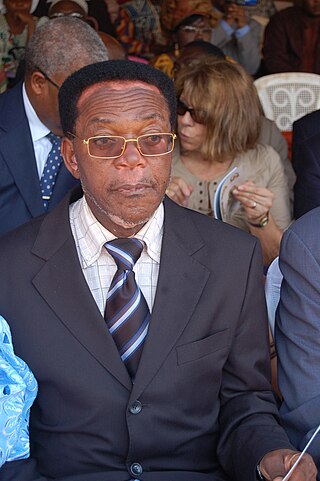
Jean Nkuete is a Cameroonian politician and economist who has been Secretary-General of the Central Committee of the Cameroon People's Democratic Movement (RDPC), the ruling political party in Cameroon, since 2011. He was Executive Secretary of the Economic and Monetary Community of Central Africa (CEMAC) from 1999 to 2006 and served in the government of Cameroon as Minister of Agriculture and Rural Development from 2006 to 2011.
The National Union for Democracy and Progress is a political party in Cameroon, drawing its main support from the north of the country. It was established as an opposition party in the early 1990s and won the second largest number of seats in the 1992 parliamentary election. The UNDP's National President is Maigari Bello Bouba, who is currently a Minister of State in the government.
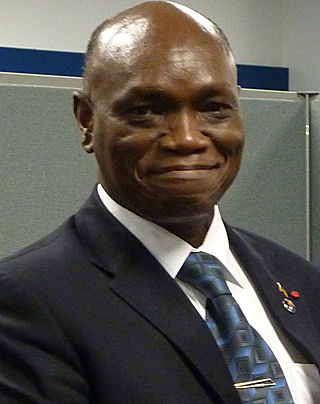
Henri Eyebe Ayissi is a Cameroonian politician and diplomat who served in the government of Cameroon as Minister of Foreign Relations from 2007 to 2011. He was Minister-Delegate at the Presidency for the Higher Audit Office from 2011 to 2015 and has been Minister of Agriculture since 2015.
Hamadou Moustapha is a Cameroonian politician, currently serving as Minister in Charge of Special Duties at the Presidency of the Republic of Cameroon. He served in the government from 1975 to 1983, again from 1992 to 1997, and he has held his current position at the Presidency since December 2004. Additionally, Moustapha is the National President of the National Alliance for Democracy and Progress (ANDP), a small party that supports President Paul Biya.
René Emmanuel Sadi is a Cameroonian politician who has served in the government of Cameroon as Minister of Territorial Administration since 2011. Under President Paul Biya, he was Second Assistant Secretary-General of the Presidency from 2004 to 2009 and Minister for Special Duties from 2009 to 2011. Sadi also served as Secretary-General of the Central Committee of the Cameroon People's Democratic Movement (RDPC), the ruling political party in Cameroon, from 2007 to 2011.
Adolphe Moudiki is a Cameroonian political figure who has been Director-General of the National Hydrocarbons Company, the state oil company of Cameroon, since 1993. A long-time associate of President Paul Biya, Moudiki was Minister of Labor from 1987 to 1988, Director of the Civil Cabinet of the Presidency from 1988 to 1989, and Minister of Justice from 1989 to 1991.

The Anglophone problem in Cameroon refers to a socio-political issue rooted in the country's colonial legacies from the Germans, British, and the French.



